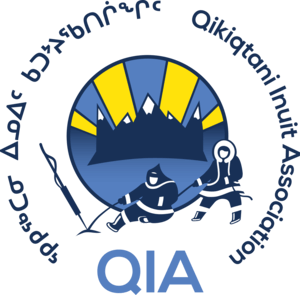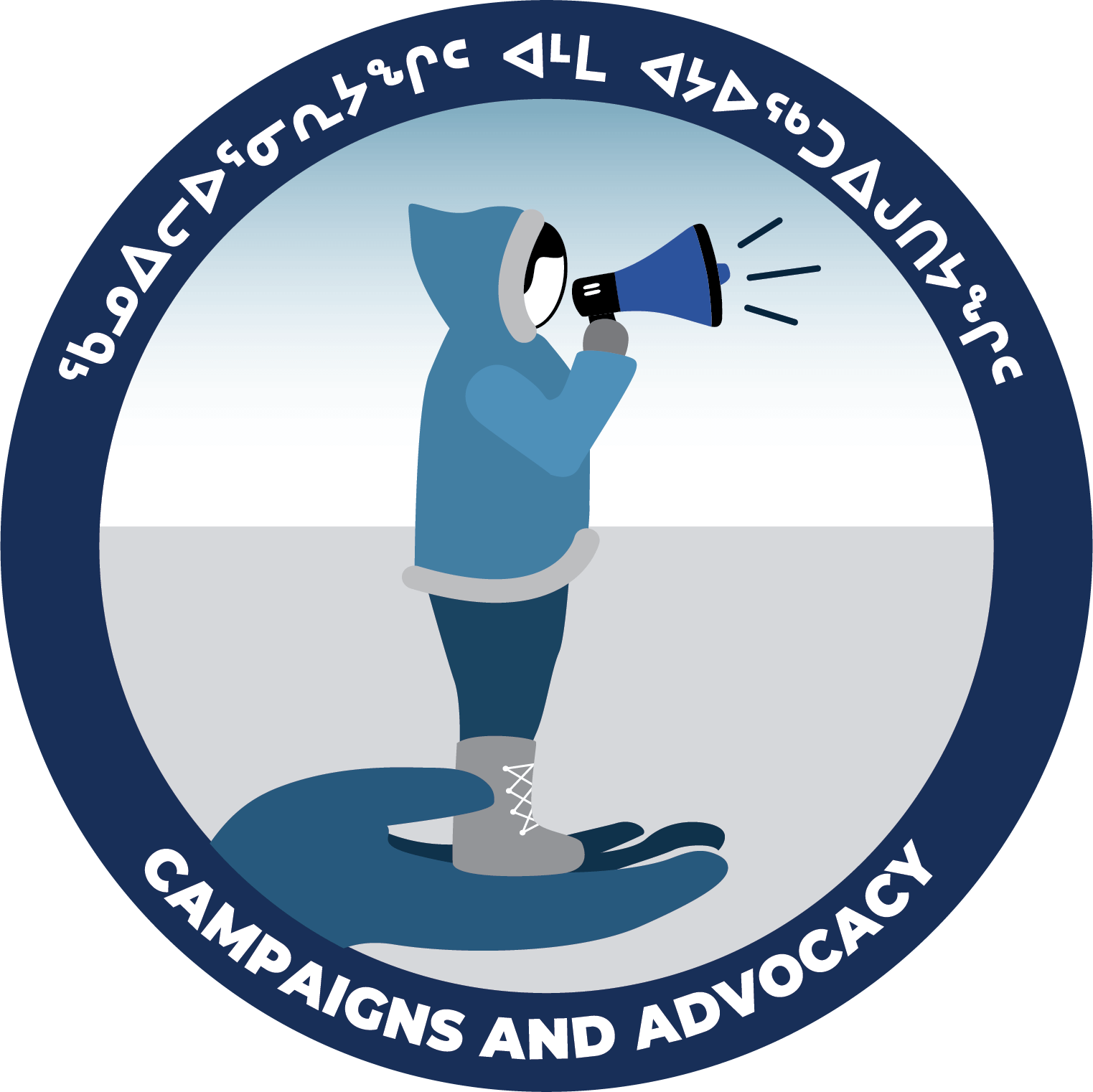Food Sovereignty
Empowering Inuit to Feed their Communities
Nunavut suffers from chronic food insecurity. Over 70 per cent of Nunavummiut are food insecure. Current approaches to remedy this crisis, such as the subsidy on imported foods, are not working. Nunavut needs to shift its thinking from feed security to food sovereignty – to empower Inuit to feed their communities.
The Nunavut Agreement gives Inuit the right to control our natural resources and food supply. Inuit environmental stewardship of our lands and waters, and management of our parks and conservation areas, is linked to control of the wildlife that sustains us.
QIA’s vision to achieve food sovereignty requires:
- Renewed policy frameworks and funding models to acknowledge the focus of country food to Inuit culture, economy, and well-being
- Investment in harvesting enabling infrastructure, such as marine infrastructure, multi-use facilities, food processing plants, and training facilities
- Funding harvesters and stewardship programs that provide wages for harvesters and stewards, equipment and supplies and programs for elders and youth
To learn more:
Food Sovereignty and Harvesting
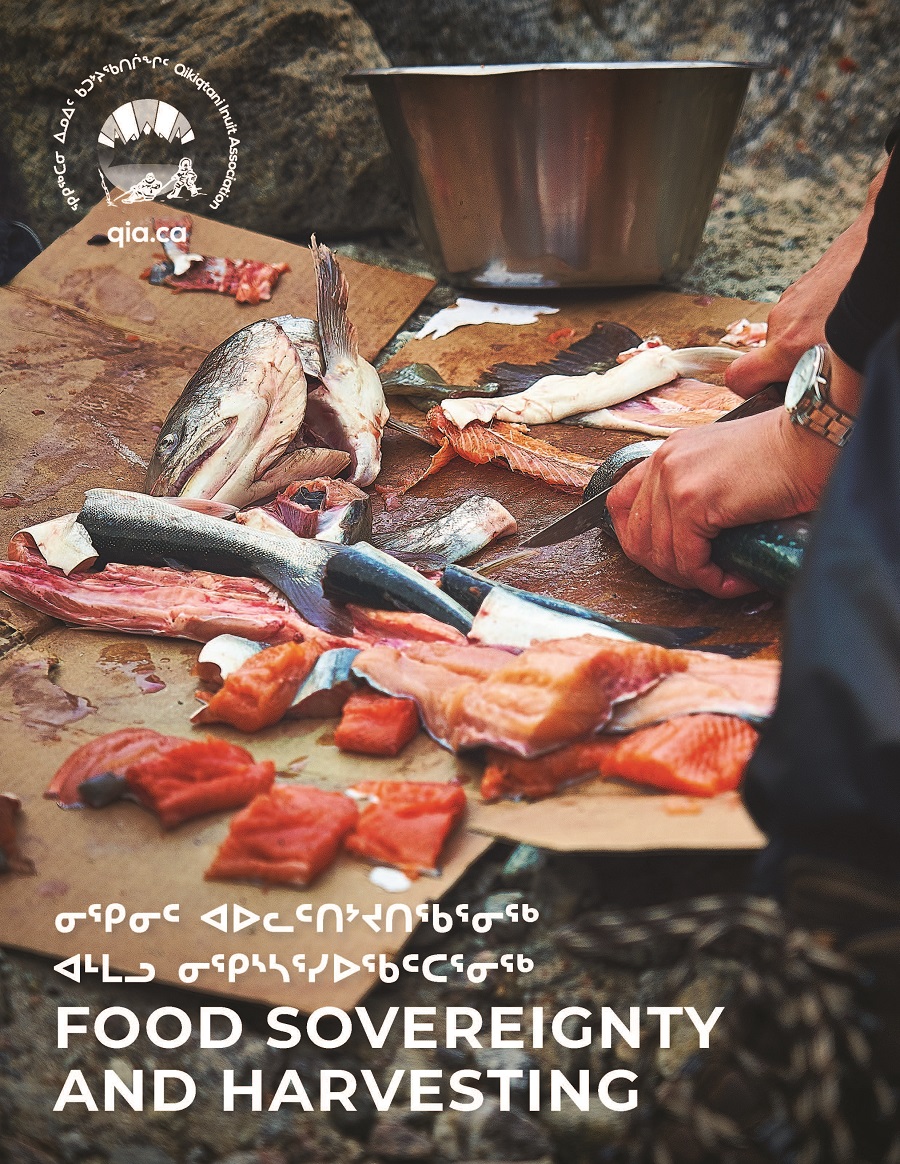
Inuktitut Language Month
Promoting and Preserving the Inuktitut Language
QIA continues to promote Inuktitut with our annual Inuktitut language month activities that are held throughout February. Events during this month include a daily showcase of Inuktitut children’s books published through the QIA/Inhabit Media partnership, an annual book fair in partnership with Inhabit media.
QIA’s flagship event during this month is our annual song and poem contest. Each year we receive submissions celebrating the creativity of Qikiqtani Inuit and their efforts to create art using their mother tongue.
Check back for updates on the annual contest.

Word of the Day
Bringing Awareness to Inuktitut Language and Inuit Art
The Word of the Day program was created to promote Inuktitut language and Inuit artwork through QIA’s Facebook, Instagram, and Twitter social media.
The Word of the Day program launched in February 2017. The program posts a daily Inuktitut word and/or phrase with translation and pronunciation information and pairs it with Inuit artwork. The Word of the Day program quickly gained popularity with some of the posts liked and shared hundreds of times. In winter 2019, the program was expanded to include audio clips of each word and phrase. This expansion was supported through Government of Nunavut Culture and Heritage funding.
Follow QIA on Facebook, Instagram, and Twitter to learn a new Inuktitut word each day.

Nunavut Heritage Centre
Preserving Nunavut’s Heritage
Nunavut is the only Province or Territory in Canada without a designated heritage space to house and showcase its history. There are currently more than 140,000 artifacts and fine arts that belong to Nunavut stored and preserved in other jurisdictions.
QIA and Nunavut Tunngavik Inc. (NTI) have each pledged $5 million to make the Nunavut Heritage Centre a reality. QIA has been working towards prioritizing the establishment of the Nunavut Heritage Centre and envisions it being built on Inuit Owned Lands in Iqaluit.
In November 2017, QIA and Qikiqtaaluk Corp. signed a lease to develop a parcel of Inuit Owned Land along Federal Road in Iqaluit. This land is designated as the potential future home of the Nunavut Heritage Centre.
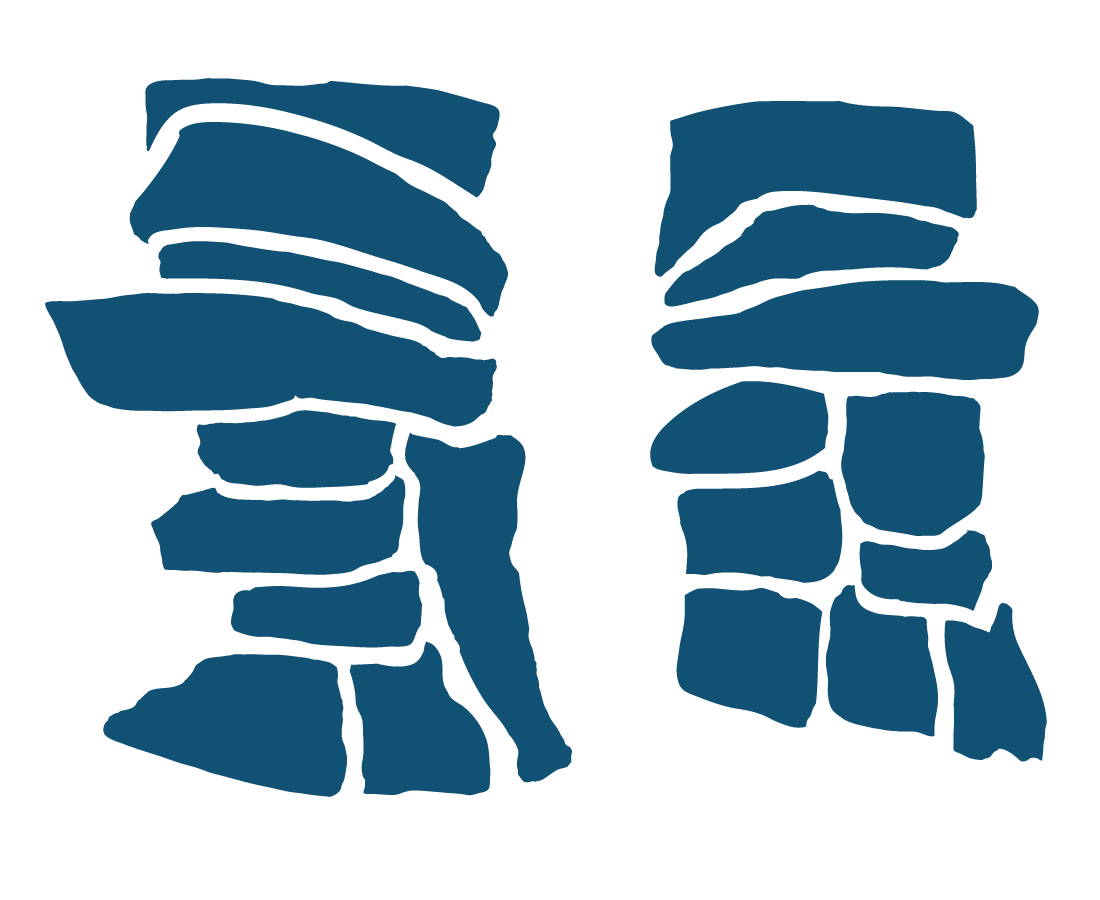
It’s Our Vote
Every Vote Matters
In 2017, QIA launched the “It’s Our Vote” campaign to encourage Qikiqtani Inuit to take part in the 2017 Nunavut territorial election. Since that time, QIA has used the “It’s Our Vote” slogan to inspire Qikiqtani Inuit to vote in municipal, territorial, and federal elections as well as leadership elections for QIA and Nunavut Tunngavik Inc.
The aim of the campaign is to encourage voter turnout and provide Qikiqtani Inuit with the tools needed to make an informed choice on Election Day.
Arctic Policy Framework
A new roadmap for the Arctic
There are longstanding inequalities in transportation, energy, communications, employment, community infrastructure, health and education. A new Arctic Policy Framework to address these inequalities was first promised by the Liberal Government shortly after the 2015 federal election.
The federal government shared “Stronger Together: and Arctic and Northern Policy Framework for Canada” validation draft on December 14, 2018.
QIA responded to the validation draft in January 2019. QIA’s response stressed that an Arctic Policy Framework must be informed by Inuit Qaujimajatuqangit (Inuit Traditional Knowledge), and address healing and reconciliation for past injustices while looking to the future by building a sustainable economy.
Specifically, QIA called for:
- Action on the Qikiqtani Truth Commission. On August 14, 2019 the Government of Canada formally acknowledged and apologized for practices which radically transformed the Inuit homeland and traditional ways of life from 1950 and 1975. For more information see Qikiqtani Truth Commission.
- Renewed policy frameworks and funding models, including adequate consultation and input from Inuit organizations and long-term stable funding
- Investments in major economic infrastructure, such as deep-sea ports, airport facilities, telecommunications, and clean energy
- Investments in a conservation economy, including funding and infrastructure that supports food sovereignty and a skilled workforce
- Social and cultural infrastructure that supports reconciliation. This infrastructure shall meet obligations under the Nunavut Agreement, strengthens and empowers Inuit communities and respects Inuit Qaujimajatuqangit.
On September 10, 2019 Canada’s Arctic and Norther Policy Framework was launched.
To learn more:
QIA’S Response to “Stronger Together: An Arctic and Northern Policy Framework for Canada.”
Canada’s Arctic and Norther Policy Framework
Tuberculosis / Nanilavut
Eliminating Tuberculosis
QIA is committed to eliminating tuberculosis in the Qikiqtani region and across Nunavut. Today Qikiqtani Inuit still face rates of tuberculosis disease more than 300 times higher than Canadian-born non-Indigenous population. Tuberculosis is preventable and curable.
QIA is working with our communities, the Government of Nunavut, and Nunavut Tunngavik Inc. to create Nunavut’s regional Tuberculosis Elimination Action Plan. This action plan is committed to reducing the rate of tuberculosis by 50 per cent by 2025, and to eliminate tuberculosis in Inuit homelands by 2030.
Nanilavut: Let Us Find Them
In March 2019, Canada’s Prime Minister, Justin Trudeau, issued a formal apology on the behalf of the Government of Canada to Inuit for its actions during the tuberculosis epidemic from the 1940’s to the 1960’s. During this time, thousands of Inuit were sent away from their communities for treatment in southern Canada, away from their home, their language and their culture. Often, Inuit who died during treatment were buried far from home, their fate and resting place not told to family members.
Along with the apology, the Prime Minister announced the launch of the Nanilavut (let us find them) Initiative. This initiative will help families find information on loved ones sent away during the tuberculosis epidemic. It will also provide other support including mental health assistance and commemoration activities.
To learn more:
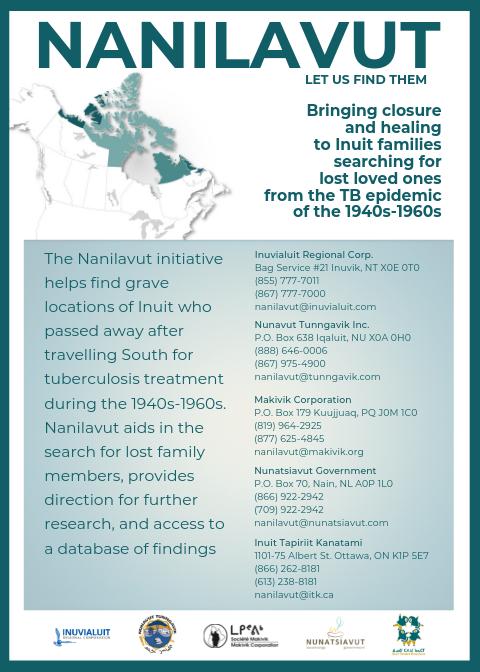
Inuktitut Language
QIA is committed to helping preserve and promote Inuktitut language through programming and awareness. Inuktitut is intrinsically connected to Inuit cultural practices and values. Maintaining Inuktitut as the primary language in the Qikiqtani Region fosters cultural pride, strengthens Inuit identity and increases opportunities for Inuit leadership in all areas of work and governance.
Approximately 70 per cent of the Qikiqtani population speaks Inuktitut. In Nunavut, where 85 per cent of the population is Inuit, approximately 60 per cent speak Inuktitut in their home. In the past decade, use of Inuktitut in the home has dropped over 10 per cent. If this trend continues it is predicted that by 2050, the Inuktitut language will be spoken at home by less than 10 per cent of Inuit in Nunavut.
North American Indigenous languages have one of the lowest survival records. Many Indigenous languages are now extinct because of colonial assimilation policies.
QIA has several campaigns and programs dedicated to preserving and promoting Inuktitut language including:

Housing
Through the Opportunities Fund, QIA is a proud supporter of the Uquutaq Society’s men’s transitional home in Iqaluit. QIA is committed to supporting organizations working towards sustainable housing solutions.
Nunavut’s infrastructure needs repair and expansion in order to support and nurture a thriving population. The housing shortage has existed since Nunavut’s inception and has grown into a housing crisis. With an urgent need for more than 3,500 units, resources must be appropriated with a national emergency priority.
Through forced relocation and assimilation between 1950 and 1975 the federal government laid the foundation for the housing crisis that exists today. This foundation has been perpetuated by inadequate and unstable funding. Reconciliation must address these past injustices while looking to the future. Foundational infrastructure that supports the basic human requirements of shelter, safety and security are urgently needed to build a sustainable and prosperous Nunavut.
The housing shortage is a significant barrier to empowering Inuit and to economic and social growth in Nunavut. Over 50 per cent of Inuit live in social housing and depending on the community up to 75 per cent in social housing are also faced with overcrowding.
QIA advocates on Qikiqtani Inuit behalf for investments in housing.
To learn more:
Infrastructure
There is a current infrastructure deficit in Nunavut. The deficit spans all basic infrastructure such as water and wastewater, communications, transportation, and cultural infrastructure.
Basic Infrastructure serves as the foundation for economic activity. Nunavut needs strategic long-term, predictable investments in infrastructure to grow our economy. The lack of infrastructure in Nunavut has constrained Inuit economic growth and cultural prosperity, and the result is economic leakage from our Territory.
QIA advocates for policies, programs, and investments to close this infrastructure gap and bring economic opportunities to Inuit in our Region and Nunavut-wide.
To learn more:
Highlights Tallurutiup Imanga and Tuvaijuittuq Agreements
QIA’s Response to “Stronger Together: An Arctic and Northern Policy Framework for Canada.”

